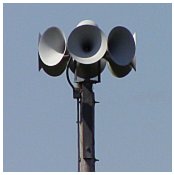
Karl J Sherlock
Associate Professor, English
Email: karl.sherlock@gcccd.edu
Phone: 619-644-7871
 Interjections are categorized as one of the eight main parts of speech. They're pretty straightforward, so it isn't necessary to break down the topic any further than this one single page.
Interjections are categorized as one of the eight main parts of speech. They're pretty straightforward, so it isn't necessary to break down the topic any further than this one single page.
To interject means to interrupt by putting oneself or something else in the way; to come between. Interjections are interruptive words or phrases used to exclaim or protest or command. They sometimes stand by themselves, but they are often contained within larger structures.
Virtually none of them have any place in formal tone and academic writing. Get used to recognizing them and editing them out of your writing.
Many dictionaries and grammar handbooks will use the words “exclamation” and “interjection” synonymously. As verbs, “exclaim” and “interject” are, indeed, very similar. To make matters even more confusing, a great many interjections are vernacular, slang, vulgarity, or idioms, and many exclamatory sentences rely on these to set an exclamatory mood. In the language of grammar, however, writers are cautioned to treat interjections and exclamations as separate concepts. After all, not all exclamatory sentences use interjections, and not all interjections are exclamatory.
The difference between interjections and exclamations is the difference between “obnoxious” and “loud”: one busts in and intrudes on the atmosphere of a sentence, while the other is more like the sentence suddenly finding itself in a loud room. Here are two ways of assessing whether you're writing an interjection or an exclamation.
Point 1. The word “interject” means “to position in an interfering manner; to come between”; an interjection, then, is a word or phrase that interrupts one tone with another. The word “exclaim” means to “claim, shout or otherwise express openly”; an exclamation, then, is defined by the volume of the whole sentence compared to other sentences around it.
The phrase “a helluva” is an interjection that stands apart from the rest of the sentence and gives it color, but it isn't crucial to the meaning or description. In the exclamation, the entire sentence is expressed with a mood of loud excitement.
Point 2. An interjection is an utterance that adds to the voice or style of a sentence,whether or not that sentence is exclamatory. Because an interjection isn't always expressed in an exclamatory mood, it doesn't necessarily have to come with an exclamation point at the end. An exclamation, however, is the expression of an idea in aloud mood; the writer's motive is to be louder in such a sentence, and, to show that, an exclamatory sentence always ends with an exclamation point.
In these examples, the words “Uhm” and “errr” are interjections that add to the tone—or, voice—of the character, but the sentence is not an exclamation and doesn't end with an exclamation point. Rather, it's an interrogative sentence (contained as a quote within a declarative sentence.) In the stranger's response, the entire sentence is an exclamation (as well as a question) but there are no interjections in the sentence.
Point 3. An interjection stands apart from the grammar of the sentence in which (or with which) it occurs. An exclamatory sentence is, or implies, a complete independent clause.
Words like “Yikes!” “so” and “freakin'” are colorful but inconsequential to the rest of the sentence. They add a certain tone of their own, but, overall, the sentence keeps its declarative mood. In this instance, the word “Yikes!” also comes with punctuation, demonstrating that some interjections do, indeed, merit exclamation. In the other example, most of the grammar of these three exclamatory sentences is implied; if they were translated into declarative sentences with restored subjects and predicate verbs, the full sentences would read, “[You want the] keys to the car?! [I am] sorry, but [there is] no way [that will happen.] [At least it will] not [happen] tonight.” An exclamation point means that the volume of a sentence is more important than its grammar: that so much emotion is flooding the mood of expression, the most expressive words can drown out other parts of speech in the sentence.
Reinforcing the notion that interjections have no place in formal writing, the method used to diagram them is to isolate them and leave them outside the structure of the diagram, exactly as you would a Direct Address in a Noun Phrase:
Karl J Sherlock
Associate Professor, English
Email: karl.sherlock@gcccd.edu
Phone: 619-644-7871

8800 Grossmont College Drive
El Cajon, California 92020
619-644-7000
Accessibility
Social Media Accounts